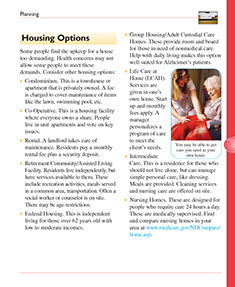Mature Health: Over Age 50
Housing Options
Some people find the upkeep for a house too demanding. Health concerns may not allow some people to meet these demands. Consider other housing options:
• Condominium. This is a townhouse or apartment that is privately owned. A fee is charged to cover maintenance of items like the lawn, swimming pool, etc.
• Co-Operative. This is a housing facility where everyone owns a share. People live in unit apartments and vote on key issues.
• Rental. A landlord takes care of maintenance. Residents pay a monthly rental fee plus a security deposit.
• Retirement Community/Assisted Living Facility. Residents live independently, but have services available to them. These include recreation activities, meals served in a common area, transportation. Often a social worker or counselor is on site. There may be age restrictions.
• Federal Housing. This is independent living for those over 62 years old with low to moderate incomes.
• Group Housing/Adult Custodial Care Homes. These provide room and board for those in need of nonmedical care. Help with daily living makes this option well suited for Alzheimer’s patients.
• Life Care at Home (LCAH). Services are given in one’s own home. Start up and monthly fees apply. A manager personalizes a program of care to meet the client’s needs.
• Intermediate Care. This is a residence for those who should not live alone, but can manage simple personal care, like dressing. Meals are provided. Cleaning services and nursing care are offered on site.
• Nursing Homes. These are designed for people who require care 24 hours a day. These are medically supervised. Find and compare nursing homes in your area at www.medicare.gov/NHCompare/home.asp.

Download an offline pdf file.
RELATED ARTICLES
<
>
2021 © American Institute for Preventive Medicine - All Rights Reserved. Disclaimer | www.HealthyLife.com








